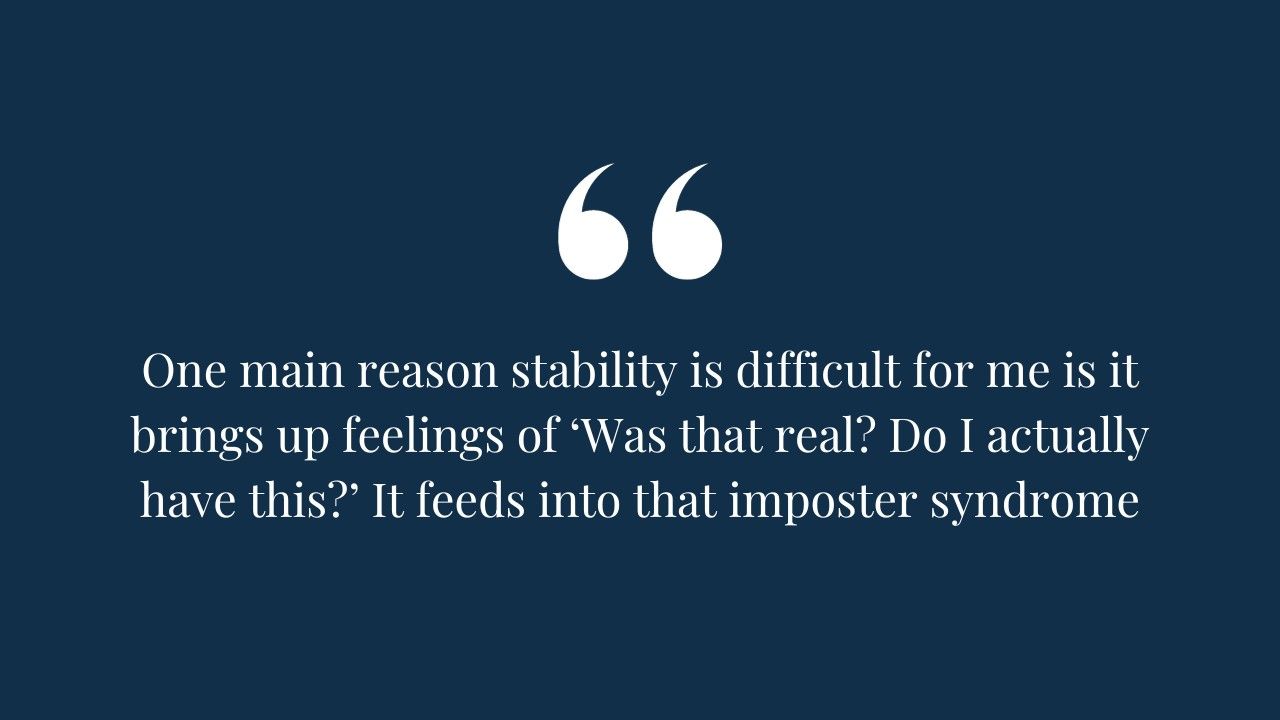The struggle of stability when living with a mood disorder
updated on Nov 15, 2023

Exploring the paradoxical way that finding your mental health in a stable place can actually be tricky territory to navigate for those with mood disorders, and how we can find contentment when we’re stable
For many people living with a mood disorder, life is full of desperate lows, extreme highs, and not much in between. When they become stable, people often miss the rollercoaster of intense moods they’re used to.
Stability can feel strange and alien if you’re used to mood fluctuations. I personally live with bipolar disorder, and when I first became stable after years of being unwell, I didn’t know what to do with myself. I was used to living an intense life, full of drama, fear, anger, and emotional heights and depths.
Why do people find stability difficult?
Therapist Siobhan Butt explains why people, especially those with mood disorders, find stability challenging.
“If you grew up in a household where shouting was the norm, and moods were determined by others you live with, it’s likely that stability as an adult feels unsettling for you,” Siobhan explains. “We are attracted to what we know – whether or not it is good for us, it feels normal for us. If you have a mood disorder such as bipolar, it is likely until you got your diagnosis life felt unstable and probably quite chaotic when you were growing up. Stability, now in adulthood, could feel like an unfamiliar territory, and therefore cause feelings of anxiety, or possibly even feel quite boring.”
I spoke to Bex, who also has bipolar disorder, to hear another perspective on stability, and the difficult feelings it manifested.
“I have bipolar disorder, and one main reason stability is difficult for me is it brings up feelings of, ‘Was that real? Do I actually have this?’ It feeds into that imposter syndrome and it makes me feel like I made a huge fuss for no reason, which then feeds into feelings of overreacting,” Bex says. “It’s led to me stopping medication in the past, which messes up stability pretty quickly!”

The temptation to stop medication and to actively self-sabotage is a common reaction to new-found stability. As with Bex, I’ve wanted to stop taking medications which keep me well. For me, the euphoria I feel during a manic episode of bipolar is unparalleled to any other I’ve experienced. Siobhan explains why people tend to sabotage their stability, rather than feeling content with staying well.
“Sometimes people sabotage their stability in order to bring about the familiar feelings and patterns that living in instability brings. We may subconsciously choose relationships that bring that feeling of rejection and anxiety we are used to, or overthink the smallest things. When you expect instability, stability can be threatening as you are unsure what to expect, or how to behave when stability is taken away.”
How can we become more comfortable with stability?
Therapist Siobhan offers some sage advice on how to tackle these tricky feelings.
“It is really difficult to relearn patterns that we have deeply embedded within us, and it will be challenging and uncomfortable,” Siobhan says. “Engaging in therapy to understand your patterns, and build self-awareness, is a key way you can help know what is happening for you, and think about breaking the cycle. Developing your own self-worth can also enable someone to become more comfortable with stability. When we have a strong sense of self-worth, we feel more secure with ourselves and those around us.
“The feeling to sabotage the stability and seek out drama may still flare up from time to time. Notice when it does, be curious about it, and ask yourself ‘What do I really need right now?’ It’s OK that it will take some time to understand and feel comfortable with stability; it’s never about the speed of change, but about the trajectory. You are on your own journey of self-awareness and self-growth and, with hard work, you can make it through.”
Sometimes I daydream about the fun side of mania, and how if I stopped taking medication I could get back to that. Then, I remember all the negatives: the delusional thinking; the intense anger; obsessive and risk-taking behaviour. There’s also the sense of foreboding surrounding me that at any time, without taking care of myself and staying stable, I’ll become severely depressed. I realise it’s not worth being unwell and, with stability, I can live a healthier life.

Bex has some advice as well on how to cope with new stability. “Take advantage of everything you couldn’t do when unwell. For me, that means I can start cooking again, and my house finally has a deep clean. It means I’m not overly irritable and unable to socialise. Stability doesn’t mean you weren’t unwell, or you don’t have your diagnosis, so as hard as it may be, you have to work to eliminate those imposter feelings.”
Stability is about taking each day as it comes. It’s about embracing all the things you can do now. It’s about feeling calm and organised, feeling happiness without worrying it will morph into something toxic. Waking up and feeling slightly down, but being able to carry on with your day without depression creeping up on you. You can accomplish more, do more, socialise more, and live more. Life shouldn’t be full of extremes. It should be quieter and calmer. Sometimes, yes, even boring!
. Take stock of, and appreciate, what you can do when you’re stable.
. Appreciate and notice the small pleasures in life.
. Learn to feel comfortable with the mundane, feeling calm, or even bored.
. Ask yourself ‘why’ when the urge to self-sabotage rises.
. Look at how far you’ve come, and accept how ill you were before stability.
. Try new activities and hobbies you weren’t able to do previously.

